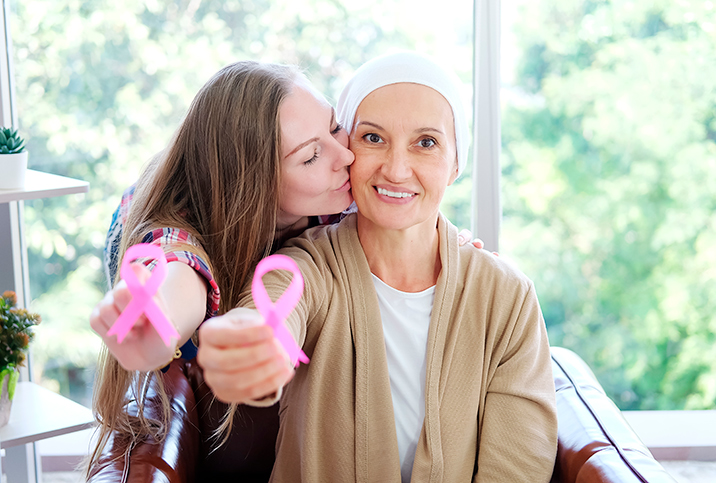For One Ovarian Cancer Survivor, Monthly Screenings Give Peace of Mind

When Michele McClintic neared 50 years old, she began experiencing weight gain and a bloated feeling in her stomach. The Dallas resident was tired and often had to urgently urinate.
Initially, the married mother of two adult children wasn't alarmed and instead blamed her age. But her symptoms were more than just the aging process at work.
McClintic had ovarian cancer.
Ovarian cancer forms in the tissues of one or both ovaries, and can be difficult to detect because of the subtle and wide-ranging symptoms.
"They caught it before it spread too far," McClintic said in an interview. "I looked pregnant. They drained 7 pounds of fluid off my stomach." McClintic's treatment included chemotherapy and the removal of her uterus.
Initially, the married mother of two adult children wasn't alarmed and instead blamed her age. But her symptoms were more than just the aging process at work.
"I had a complete hysterectomy," she explained.
When a woman has a hysterectomy, she will likely experience early menopause symptoms, such as hot flashes and mood swings, according to Enoh Ukpong, Ph.D., MSN, R.N., an adjunct professor of nursing at Anna Maria College in Paxton, Massachusetts.
Ukpong explained that one of the side effects of a hysterectomy is hormones that would have been secreted by the uterus are now gone, so hormone replacement therapy (HRT) is typically prescribed. "Anything that can be replaced so someone can live on is a good thing," she said.
Screening for ovarian cancer
The American Cancer Society estimates that this year, 21,410 women will be diagnosed with ovarian cancer, and 13,770 will die from the disease.
One of the reasons ovarian cancer is called the silent killer is it can be difficult to screen for. Unlike a Pap smear to diagnose cervical cancer or a mammogram to detect breast cancer, there is no similar test for ovarian cancer.
"There are some screening options, including ultrasounds and CA 125 testing, but they've never been shown to impact mortality or improve outcomes, so they're very limited," said Ritu Salani, M.D., MBA, director of the Division of Gynecologic Oncology and professor of Obstetrics and Gynecology at UCLA. "They are probably more for psychological benefit than true diagnosis and survival benefit."
Though she's been cleared, McClintic still receives monthly bloodwork to screen for cancer recurrence.
"If we see a trend of the tumor marker CA 125 going up, then we would do more tests," McClintic said. "My body reacted very well to the chemo. My oncologist wants to see me every month. I'm fine with that, just to keep peace of mind for my husband and me. I'm just happy that we beat it."
Symptoms often only arise in the later stages of the disease, making it nearly impossible to diagnose early.
Cancer antigen 125, or CA 125, is a protein. Elevated levels of CA 125 can indicate conditions such as endometriosis, liver disease and various cancers.
"The tumor marker CA 125 is a very useful marker for people who have been diagnosed with ovarian cancer, but it isn't a very good marker when you are screening somebody who has never had ovarian cancer," said Alan Lindemann, M.D., OB-GYN. "The prevailing thought on this is that the test is valid for women who have already been identified with ovarian cancer, not for women who have not been identified."
Signs of ovarian cancer include abdominal pain, indigestion, loss of appetite, bloating and frequent urination, which Ukpong explained is caused by the cancer putting pressure on almost every organ.
"Loss of appetite happens for the same reason, because the cancer is growing and taking up space," Ukpong said.
Symptoms often only arise in the later stages of the disease, making it nearly impossible to diagnose early.
The fear of cancer recurrence
While there is nothing you can do to completely prevent cancer recurrence, there are steps you can take to keep your body as healthy as possible.
As part of her treatment, McClintic is now eating a plant-based, organic diet. "I limit my red meat and I try to eat a lot of fruits and vegetables," she said.
The American Cancer Society recommends cancer survivors eat a high-nutrient, plant-based diet with limited amounts of red meat, processed meat and sugar.
"You want to lower any amount of anything that will cause an adverse effect in your system," Ukpong advised.
Regular exercise is another good practice for cancer survivors. The Ovarian Cancer Research Alliance notes that exercise can promote overall good health and have a positive impact on mental health—an area that some survivors may struggle with due to fear of cancer recurrence and the difficult experience they've gone through.


















